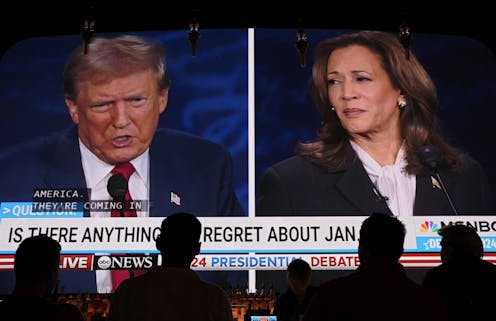
Even after Vice President Kamala Harris lost the 2024 presidential election, Americans continue to argue about her race.
During the campaign, President-elect Donald Trump accused Harris, who is biracial, of toggling between being Indian and being Black. Once, a Fox News reporter suggested she had started speaking like a Southerner, prompting discussions about her supposed accents.
On the internet, claims questioning Harris’ racial authenticity played out on a very visible and modern cultural battleground: memes.
Memes are visual markers of cultural happenings that often circulate and replicate widely due to their simplicity and resonance.
As a professor of African American digital media culture, I think the Harris memes serve as a vehicle for users to excavate complex and unfinished cultural conversations, such as racial authenticity, as I detail in my 2024 book.
In other words, the Harris memes can be seen as representing Americans’ contradictions and complexities regarding the issue of race and authenticity, more so than characterizing the candidate herself.
Coconut tree meme
Because Harris doesn’t discuss her multiracial background very often, memes allow the public to address the cultural examination of the first Black and South Asian female presidential candidate.
One of the most recognizable memes questioning Harris’ race is that of the coconut tree.
The meme was born after a speech Harris delivered in which she shared that her mother would urge her to be aware of her cultural context. Harris said leaders should be aware of historical context when trying to help young people in education. They should pay attention, she added, to the context of those young people’s parents, grandparents and extended households.
At one point, Harris quoted her mother as saying: “You think you just fell out of a coconut tree?”
For some, the coconut tree became a metaphor of joy in the otherwise banal political system. For example, the North Carolina chair of the Democratic Party tweeted in July 2024, “We all fell out of the coconut tree today into a gym full of democrats!!!! 🥥✨🤠🫶”.
Others, however, circulated the coconut image to portray someone who is brown on the outside but white on the inside.
For these Harris critics, the coconut symbolized someone who is not authentically their race. The coconut meme served to represent racial inauthenticity for a few historically inaccurate reasons.
The first is Harris’ lighter skin tone as an ostensible measure of her proximity to Blackness – the closer one is to the coconut’s white inside, the lighter they are. This is historically inaccurate, as history scholars have long debunked race as reducible to biological markers, such as skin tone.
The second is Harris’ record as a self-described “top cop.”
Given the disproportionate contact Black people have with the criminal justice system, many Black voters viewed Harris as going against her Blackness.
Here again, the coconut meme signals that she only looks brown but is somehow white on the inside. The inaccuracy here ignores that her non-Black parent is not white.
It’s worth noting that claims of racial inauthenticity like the coconut meme can be deeply hurtful to marginalized and multiracial people.
The side-eye meme
Another Harris meme that flooded the internet is the side-eye image. The image was born after her September 2024 presidential debate against Trump, where Harris peered at her opponent with a look of astonishment.
The meme gained traction as viewers expressed bewilderment – similar to Harris’ – at many of Trump’s claims, including his statements about Harris’ race.
“Whatever she wants to be is OK with me,” Trump said during the debate.
In my own circles, women – Black women, in particular – circulated the image. They felt it aptly captured the response to decades of discrimination.
In my research, I conduct focus groups with Black women who detail the exhaustion of having to hold their tongue, particularly in the workplace, when critiqued for wearing their natural hair, for example.
Online spaces and the sharing of memes become cathartic for women like the ones I interviewed.
Harris’ favorite curse word
Finally, memes exploded of Harris pausing when talking about Trump at the same debate.
“This…” she said, followed by a prolonged pause, before adding, “… former president …”
Internet users quickly found a NowThis Impact interview of Harris in August 2024, where she revealed her favorite curse word. It starts with an “m,” Harris said, and ends with an “ah.”
In the interview Harris clarifies, “not with an ‘er,’” gesturing to African American Vernacular English, or Ebonics, wherein the “er” of standard English is commonly changed to “ah,” as in “sistah.”
Internet users appreciated Harris’ long pause in referring to Trump on two levels: the restraint from cussing both in the interview and on the presidential debate stage, and the cultural Ebonics wink she gives in her answer to the cuss word question.
The cussing example is a case, like the side-eye meme, where Black internet users identify with the vice president’s nod to Black culture, in this case through Ebonics.
The Black enough question through memes
The term racial authenticity itself is a form of stereotyping an entire group of people. Race cannot be distilled down to one experience.
But the familiarity of being a Black woman who must hold her tongue and wield the power of her eyes resonates with many Black people online. That is evident in respondents to the side-eye meme on X who posted the “universal face of a woman who…” or “I just think it’s funny when…”
In this way, Harris memes can be understood as saying less about Harris’ identity. They say more about online users’ complex negotiations with the slippery – and joyful and complicated – nature of race itself.
Raven Maragh-Lloyd receives funding from Minerva Foundation.
This article was originally published on The Conversation. Read the original article.







